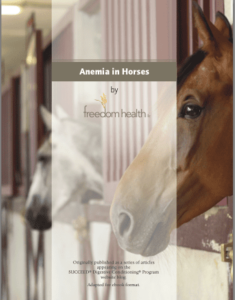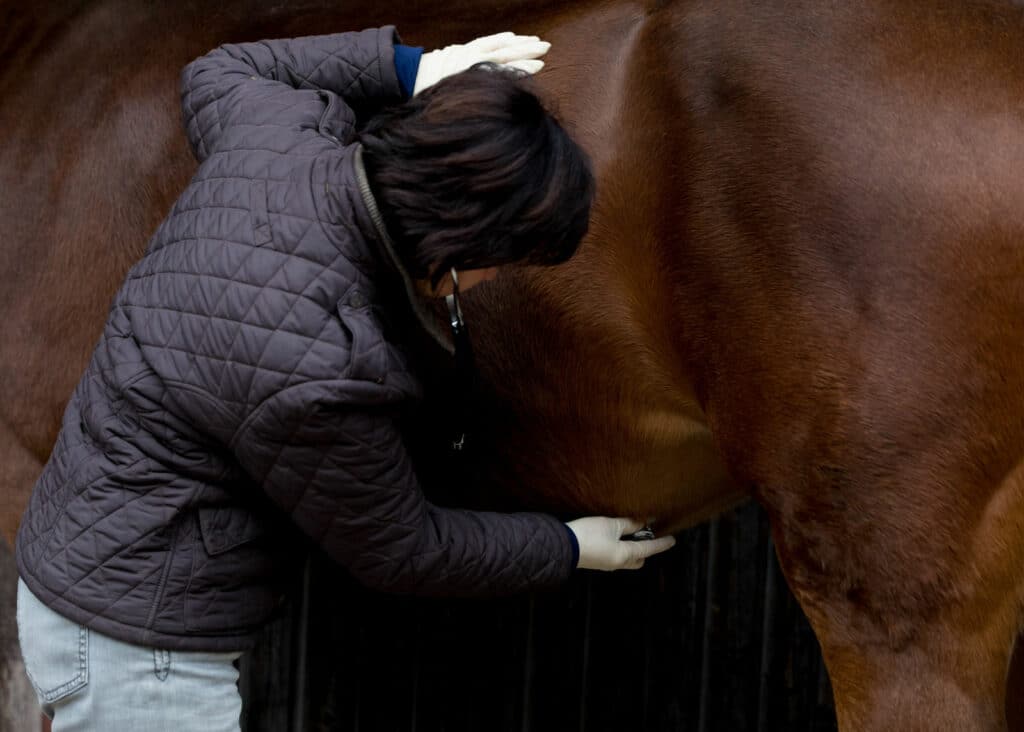Anemia in horses is rarely discussed outside of racing circles, but is an insidious condition with significant impact on a horse’s health and performance ability. In this five part series, we will provide a comprehensive look at equine anemia: what anemia is and how it affects horses, what causes equine anemia, signs and symptoms, ulcers and anemia, and treatments. Subscribe to the SUCCEED blog to follow the complete series.
Anemia in general is a multi-faceted condition with various types and causes, and the same rings true for the anemic horse. Anemia is always a symptom of a larger health issue that needs to be identified and resolved. Once anemia is diagnosed, it’s critical to continue working with your veterinarian to determine the type of anemia and the health problem that is causing it.
Anemia means that your horse has a decrease in red blood cell mass. One commonly used indicator is the packed cell volume (PCV), which measures percentage of red blood cells in a sample. The normal range for horses is for 32-48% of blood to be made up of red blood cells; horses with levels below 30% are typically considered anemic. Keep in mind that the level that indicates true anemia is somewhat subjective and varies from horse to horse. Be sure to review part 1 of this series, What is Equine Anemia, to brush up on just what anemia is, what levels may constitute anemia, and why it matters if your horse is anemic.
Three Causes of Anemia in Horses
In the broadest terms, there are three causes of anemia in horses: blood loss, blood destruction, and reduced red blood cell production. Here’s a closer look at each of these, and a sample of the conditions that can cause them.
Anemia Due to Blood Loss
Losing blood from an injury or health condition may put a horse at risk for anemia. When a horse loses blood, it loses red blood cells and plasma. The plasma is quickly topped off (a drink of water will do the trick), but the new red blood cells have to be created in the bone marrow – and that takes time.
Any type of internal or external bleeding could lead to anemia. It is generally classified as either acute (rapid onset) or chronic (persistent or long-lasting).
Causes of acute blood loss anemia include:
- traumatic injury
- ruptured blood vessels
- exercise-induced pulmonary hemorrhage
- perforated ulcer
- surgery
Causes of chronic blood loss anemia include:
- gastric and colonic ulceration
- parasites
- chronic inflammatory disease
- coagulation or platelet disorders
Once the cause of blood loss has been identified, treated, and resolved, red blood cell counts will generally return to normal within 2-6 weeks.
Blood loss anemia is by far the most common cause of anemia in horses. However, if your veterinarian rules out these potential causes, he or she will also consider anemia as a result of either blood destruction or lack of production.
Anemia Caused by Blood Destruction (Hemolytic Anemia)
Anemia in horses may also be caused by conditions that destroy blood, also known as hemolytic anemia or hemolysis. In hemolytic anemias, blood is destroyed faster than new red blood cells can be produced.
Most owners are familiar with Equine Infectious Anemia (EIA), which is what a Coggins test checks for. EIA is a viral disease that attacks the immune system, destroying blood in the process. Thanks to the use of the Coggins test, EIA is very rare (though not unheard-of) in the United States.
Other potential causes of hemolytic anemia include:
- parasites
- auto-immune disorders
- chronic infections
- septicemia
- toxins
- congenital red blood cell abnormalities
Anemia Caused by Reduced Red Blood Cell Production
If a horse’s body isn’t producing enough red blood cells, the result is obviously anemia. The most common cause of reduced red blood cell production is chronic inflammation. Chronic inflammation is commonly related to conditions such as abdominal or hoof abscesses, cellulitis, pneumonia, and peritonitis. This happens because the body sequesters iron, which is necessary for red blood cell production, away from the infected areas.
Other potential conditions that may reduce red blood cell production in horses include:
- bone marrow disease
- cancer
- kidney disease or failure
- nutritional deficiencies
- iron deficiency (extremely rare in horses)
This type of anemia is typically mild to moderate.
Next Up: Signs and Symptoms of Anemia in Horses
You now have a better understanding of what anemia in horses is and the many potential conditions that can cause it. Now it’s time to learn what signs and symptoms your horse may display that may indicate anemia, as well as how anemia can affect your horse’s health and performance. Be sure to subscribe to the SUCCEED Blog and check back for Part 3 of this series: Symptoms of Anemia in Horses.
 Get Your Free Anemia in Horses E-Book
Get Your Free Anemia in Horses E-Book
Did you find this article helpful? Download your free copy of the Anemia in Horses e-book and take the whole series home with you as a printable PDF to read and share at your leisure.
Register Now to Access Your Free Download:
[register_Email Subscribers]
Already a member? Login in here to access our E-Book Library.



